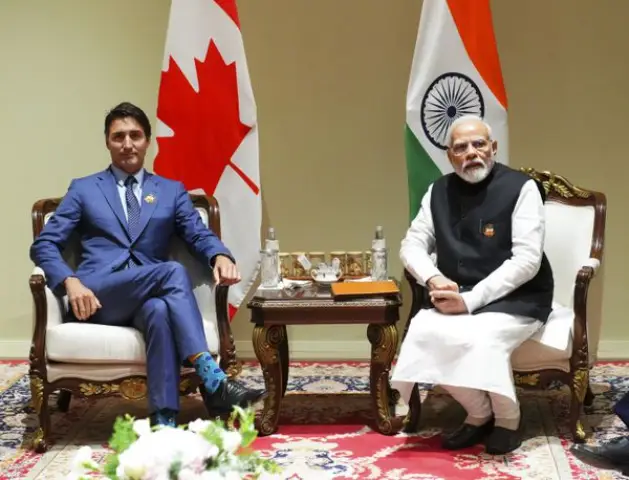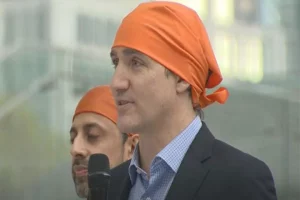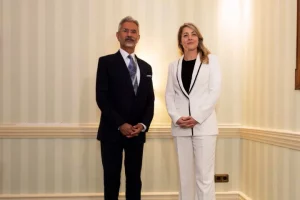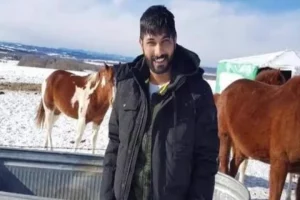Canada Foreign Minister Melanie Joly announced on Thursday (local time) that Canada has removed 41 diplomats and their 42 family members, from India over the ongoing row between the two countries.
“As of now, I can confirm that India has formally conveyed its plan to unethically remove diplomatic immunities for all but 21 Canadian diplomats and dependents in Delhi by tomorrow, October 20. This means 41 Canadian diplomats and their 42 dependents were in danger of having immunity stripped on an arbitrary date. And this would put their personal safety at risk,” Joly said, as she confirmed the departure of Canadian diplomats.
This comes after India suspended visa operations to Canada and called for a reduction in Canadian diplomats in India, calling for ‘parity’, owing to the ongoing diplomatic row between the two nations.
Canadian Foreign Minister said, “…we have facilitated their safe departure from India. This means that our diplomats and their families have now left diplomatic immunities. Keep diplomats safe, no matter where they’re from and where they’re sent to. Immunities allow diplomats to do their work without fear of reprisal or arrests from the country they’re in.”
“They are a fundamental principle of diplomacy and this is a two-way street. They only work if every country abides by the rules. A unilateral revocation of diplomatic privilege and immunities is contrary to international law. It is a clear violation of the Vienna Convention on Diplomatic Relations and threatening to do so is unreasonable and escalatory. If we allow the norm of diplomatic immunity to be broken no diplomats anywhere on the planet would be safe,” she said, adding that Canada “will not reciprocate,” she said, according to CTV news.
#BREAKING: Canadian Foreign Minister @melaniejoly left red faced in a media interaction as she is unable to answer question on why Canada failed to share any evidence with India on killing of Khalistani terrorist Hardeep Singh Nijjar. Canada confirms withdrawing 41 diplomats from… pic.twitter.com/ineznOsMSD
— Aditya Raj Kaul (@AdityaRajKaul) October 20, 2023
Along with Immigration, Refugees and Citizenship Minister Marc Miller, the minister made the announcement about the development “on the situation with India” and how it will affect the level of service delivery Canada can offer following the withdrawal of diplomats.
She said, “There’s no question that India’s decision will impact the levels of services to citizens in both countries. Unfortunately, we have to put a pause on all in-person services in our consulates in Chandigarh, Mumbai and in Bangalore.”
“Canadians who need consular assistance can still visit our High Commission in Delhi. And you can still also do that in person by phone and by email,” she added.
This comes after Prime Minister Justin Trudeau was questioned on Thursday about the situation with the Indian government’s deadline of October 10 for Ottawa to considerably reduce its diplomatic presence.
Joly would have more to say later, Trudeau said, declining to directly respond to the query, according to CTV News.
“We have been continually engaged in diplomacy and in dialogue with the Indian government,” Trudeau said, adding “This is a serious matter that we are taking extremely seriously,” CTV News reported.
Stating that India’s focus is achieving ‘parity’ in terms of diplomatic presence, the Ministry of External Affairs had called for a reduction in Canadian diplomats in India citing their continued “interference” in New Delhi’s “internal matters”.
Addressing the press briefing earlier, MEA spokesperson Arindam Bagchi said, “Given the much higher presence of diplomats or diplomatic presence here…and their continued interference in our internal matters, we have sought parity in our respective diplomatic presence. Discussions are ongoing on the modalities of achieving this”.
“Given that Canadian diplomatic presence is higher, we would assume that there would be a reduction,” he added.
On being asked if the reduction in the number of Canadian diplomats could see a decrease in the number of visas issued by the Canadian High Commission in India, Bagchi said, “It’s up to the Canadian side, who they choose to staff the High Commission with…our concerns are related to ensuring parity in diplomatic presence”.
He further added that India’s primary focus is on two things; having an atmosphere in Canada, where Indian diplomats can work properly and in achieving parity in terms of diplomatic strength.
Canadian Prime Minister Justin Trudeau recently alleged that the Indian government was behind the fatal shooting of Nijjar.
Trudeau, during a debate in the Canadian Parliament, claimed his country’s national security officials had reasons to believe that “agents of the Indian government” carried out the killing of the Canadian citizen, who also served as the president of Surrey’s Guru Nanak Sikh Gurdwara.
However, India has outrightly rejected the claims, calling it ‘absurd’ and ‘motivated’. Notably, Canada has yet to provide any public evidence to support the claim about the killing of Hardeep Singh Nijjar.
Nijjar, who was a designated terrorist in India, was gunned down outside a Gurdwara, in a parking area in Canada’s Surrey, British Columbia on June 18.
Also Read: Canada’s bizarre ‘investigation’ of Karima Baloch’s killing exposes glaring double-standards




















